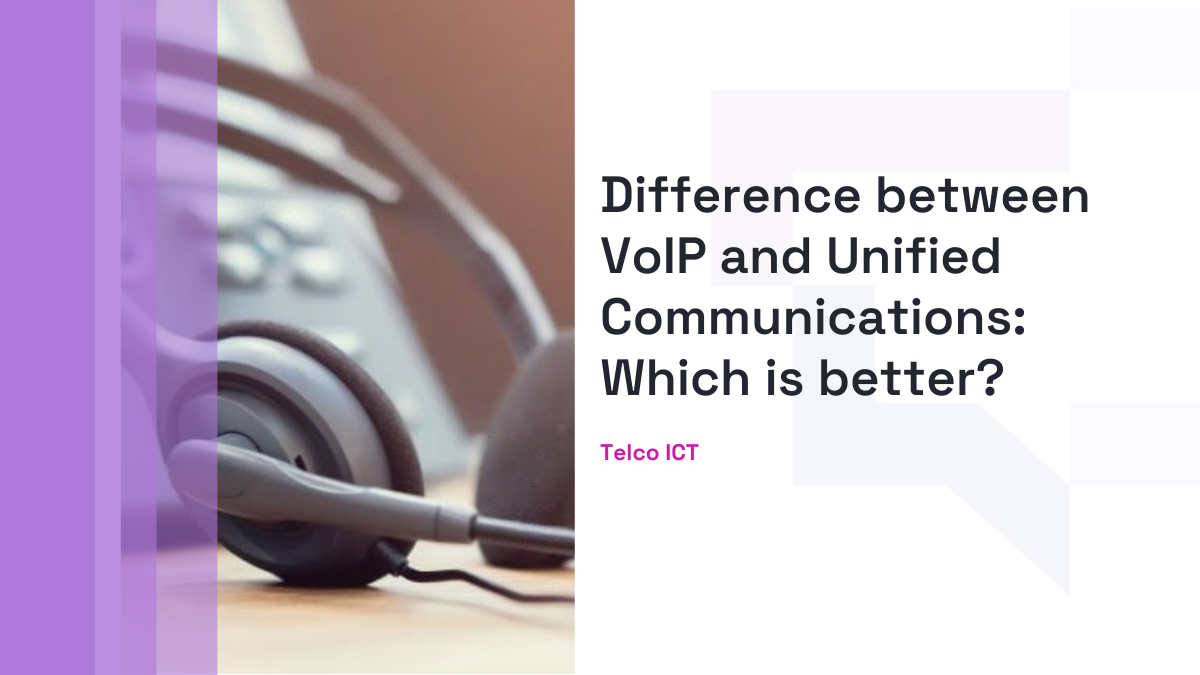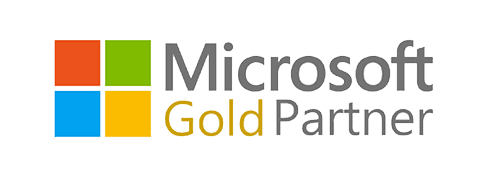All Posts / Difference between VoIP and Unified Communications: Which is better?
Communication
Difference between VoIP and Unified Communications: Which is better?

The terms VoIP and Unified Communications are likely to come up in any discussion about business communications. In the 1990s, Voice over Internet Protocol (VoIP), which offered cheaper call rates and flexible terms, began to gain popularity as a tool for corporate phone calling. However, call quality was frequently a problem. Nevertheless, communication technology has advanced further, the quality problems have been fixed, and VoIP has supplanted the once-dominant ISDN, which will be discontinued in 2025.
Most business owners or corporate buyers are well aware of Voice over IP. This is because it managed to gain a reputation for being the most preferred voice communication, even among small to mid-sized businesses. There is a valid reason why it should enjoy its success as it offers more benefits than the traditional on-premise PBX system. On the other hand, Unified Communications offers many new features or add-ons when compared to VoIP and is all set to make its mark.
VoIP calls are integrated with a variety of additional functions through unified communications. Some businesses find it difficult to determine whether UCaaS or just a VoIP service is the best fit for their needs because there are so many options available. For your convenience, we’ve broken down the two technologies and everything that goes with them.
Defining VoIP
VoIP enables you to link your phone system over IP networks as opposed to conventional phone lines. VoIP allows you to make calls from your phone or computer, from any location with a strong Internet connection, directly over the Internet. VoIP also provides capabilities like voicemail to email forwarding.
VoIP is a wonderful option for companies that want a separate phone communication channel because it includes capabilities like call recording, call logs, and dial-in conference functionality.
Advantages of VoIP Phone Systems
VoIP can provide the following advantages for companies that require easier, more affordable calling:
1. Cost Savings: They often cost less than traditional landline systems, especially for long-distance and international calls. Since VoIP uses the internet to transmit calls, there are typically lower infrastructure and maintenance costs.
2. Scalability: They are easily scalable, allowing you to add or remove lines as your business needs change without significant hardware investments.
3. Flexibility: VoIP systems can be accessed from anywhere with an internet connection, making them ideal for remote work or employees who travel frequently. This flexibility enhances collaboration and communication.
4. Feature-rich: VoIP systems come with a range of advanced features like voicemail-to-email transcription, call forwarding, call waiting, video conferencing, and integration with other software systems, enhancing overall communication efficiency.
5. Easy Integration: VoIP can integrate with other business applications, such as customer relationship management (CRM) software, helping streamline workflows and improve customer interactions.
6. Unified Communications: VoIP systems often provide unified communications platforms, combining voice, video, and messaging into a single platform. This simplifies communication and increases productivity.
7. Multi-Device Access: VoIP services can be accessed from various devices, including computers, smartphones, tablets, and specialized VoIP phones, providing consistent communication across different platforms.
8. Reduced Infrastructure: VoIP eliminates the need for separate networks for data and voice communication. A single network can handle both data and voice traffic, leading to reduced infrastructure complexity and cost.
9. Global Presence: VoIP allows you to set up virtual phone numbers in different geographic locations, which can give your business a local presence in various regions, even if you’re physically located elsewhere.
The Role of VoIP in Communication
VoIp surely succeeded in replacing private phone lines by using the Internet to make or receive calls. It can be described as a technology that discarded telephone calls by making things simple.
A traditional landline requires routing of the human voice to the destination through a network of copper wires. On the other hand, VoIP transmits voice calls by making the best use of the Internet your laptops, computers or other devices use. The Cost is less and the speed is amazing to make calls.
You can take calls even from a remote location and all a VoIP Phone System demands is a stable internet connection. There is no need to worry about a natural disaster or any power cut as VoIP is hosted through the cloud. You can also expect amazing customer engagement or a boost in customer service through VoIP.
Although VoIP technology gives everything you need to send or get messages from anyone, businesses are no longer satisfied with its limited features. They seek more features i.e. beyond typical making or receiving calls.
Here comes Unified Communications acting like an umbrella for several technologies to add up many features to phone calling.
As the name goes, it changed the way people look at a phone by offering a bundle of features as follows:
- Fax
- Instant messaging between employees
- Videoconferencing
- Phone texting
- SMS
- Integrated voicemail
When to Embrace VoIP
For SMBs or business owners seeking sophisticated call management tools and a degree of flexibility that standard business phones can’t provide, VoIP is the ideal option. Telemarketing and customer service call centers frequently use VoIP phone systems, but they also provide new and small enterprises more legitimacy. A toll-free number lends businesses an air of credibility and trust and makes them appear more established than they actually are.
Local VoIP numbers give business owners and staff privacy while also fostering a sense of familiarity that encourages callers to pick up the phone. VoIP solutions are more common among in-house teams, even if they can benefit blended and distant teams.
Although in-house personnel benefit the most from VoIP technologies, mobile sales teams and remote workers will value being able to manage business calls from any location. With IVR and ACD functionalities, customers will have more chances for self-service.
Call wait times are drastically reduced thanks to VoIP capabilities like call forwarding, ring groups, and automatic callbacks, which also considerably raise customer satisfaction levels.
What is Unified Communications as a Service (UCaaS)?
This is where all business communication technologies are combined into one streamlined platform, which is the process known as “unified communications”. One solution integrates a variety of services, including VoIP for calls, video conferencing, file sharing, chat, screen sharing, and more. Since UCaaS is a cloud-based service, no on-premises hardware is required, and software updates are performed remotely.
Consider all the communication channels you use today, including phone conversations, video chat, email, and messaging. Imagine avoiding the need to switch between many tools in order to call a colleague, send a message, or attend a meeting. The appeal of UCaaS is that it improves communication and collaboration by allowing users to share contacts, emails, and applications all in one location. As a result, productivity increases.
When to Embrace Unified Communications as a Service
Numerous communication channels and UCaaS’s vast range of features enable a wide range of use cases across sectors, corporate sizes, and remote, in-house, and blended teams.
In addition to using UCaaS to share and review important patient information, healthcare providers also utilize it for virtual appointments, scheduling, billing, and insurance payments.
Using virtual whiteboards, marketing teams may generate fresh ideas, give tasks to one another, keep track of projects, convene meetings with a single click, tag one another in chat messages for quick responses, and conduct client presentations.
Customer care and support staff can automate routine customer requests, have access to client information through interfaces with third-party CRM software, and offer tailored assistance via the customer’s preferred communication method.
UCaaS can assist you in optimizing agents, workflows, and customer communication regardless of the objectives of your organization or your target market.
What are the Differences Between VoIP and UCaaS?
The primary distinction between UCaaS and VoIP is that the former only offers one channel of communication (voice telephone calling), whilst the latter streamlines several channels of communication—including but not limited to VoIP calling—into a single dashboard. Nevertheless, other differences separate the two technologies. They Include:
1. Scope
While Unified Communications is more oriented towards enterprise communications, VoIP emphasizes Internet-based voice calling. It is important to note that several VoIP vendors include features of UC in their plans as paid upgrades or extra add-ons. On the other hand, Unified Communication products depend on VoIP as their foundation.
If you are looking for an affordable alternative to your existing phone system, VoIP phone solutions are the best one for you.
If you are looking for easy collaboration, streamlined workflows, and optimization of decision processes, then Unified Communications is perfect for your business.
2. Cost
Be it upgrading current phone systems or embracing new technology; the cost cannot be avoided for any one of them. The cost of VoIP Phone System for small businesses and Unified Communications vary since they offer different in their scope.
- Getting started with VoIP phone systems in Melbourne is super easy as many vendors give away 30 day free trials that help you to test the phone service in real-time.
- If you got a robust enterprise network infrastructure, the only expenses you need to worry about are as follows:
VoIP
1. Monthly subscription plan of service providers
2. Purchase of IP-enabled phones
Unified Communications
Although each provider offers a different UC product, it can be customized to fit your needs.
The cost of a UC upgrade depends on many factors such as:
1. Number of tools
2. Business size
3. Upgrades and features
3. Implementation
Even after the deployment of on-premise SIP solutions, upgrading to VoIP is not a problem. Several VoIP service providers offer UC features including digital faxing, integrated voicemail, and Find Me. On the other hand, UC integrates all channels and enables the tools to communicate with each other.
While the VoIP phone system for small businesses offers no equipment maintenance, less cost on monthly bills, and regular upgrades, Unified Communication is a good choice for long-term collaboration and enhanced productivity. Unified Communication Suite can be easily integrated with other sales tools or enterprise-level CRM.
Although many VoIP and UC might appear as competitors, let’s not forget that VoIP is a fundamental component of Unified Communication.
Most business owners often ask us this question. But the answer is simple. It all comes down to the present situation and needs of your company.
If you already have a conventional phone system, and you wish to cut down your phone bills, then we would recommend a VoIP Phone system.
On the other hand, Unified Communication demands massive investment; significantly more than VoIP. If you are operating your business at a narrow margin, managing with Unified Communication might get difficult. Again, it depends on your business needs and other factors.
We have listed out some questions to help you clear the cloud of confusion and make a wise decision.
As a business owner, consider the following questions and try to answer them.
For small businesses, the VoIP Phone System seems an ideal fit as there is not much collaboration and remote work.
If your business needs assistance to streamline workflows, boost collaboration, or optimize decision processes; then Unified Communications is your solution.
Advantages of VoIP
Cost Effective: Significant cost savings are possible thanks to VoIP technologies, particularly for long-distance and international calls. Communication between businesses and their clients, partners, and customers is now more inexpensive because of the abundance of VoIP providers that offer low or unlimited calling plans.
A longer list of features: VoIP services frequently provide a wide range of sophisticated features, including voicemail, call forwarding, video conferencing, and mobile integration. When combined, these attributes can enhance internal staff collaboration and elevate customer service.
Scalability: Due to the scalability of VoIP systems, businesses can adapt their communication capabilities as their needs alter. Additionally, VoIP services give businesses the flexibility to add or remove communication functions as needed to meet their needs.
Disadvantages of VoIP
Dependent on Stable Internet: Internet speed and latency can have an impact on the clarity and dependability of VoIP calls, which in turn can impair service quality. Businesses should think about investing in high-speed internet connections and collaborating with a credible and trustworthy VoIP service for the best outcomes.
Service Restriction During Emergencies: Unlike conventional phone systems, VoIP solutions might not give emergency responders precise location information, which might be dangerous. If the internet service is compromised for any reason, it will cease to be available. Businesses should think about establishing emergency procedures and having backup communication channels.
Between VoIP and UCaaS, Which is better for Business?
The response to this concern is dependent upon your business, your communication requirements, and your long-term objectives.
Consider your internal and external communications. How do your clients wish to get in touch with you? Would SMS and chat applications be useful to you? Is collaboration made even more difficult since your team is dispersed across offices or even abroad? Do you require video conferencing in order to conduct interactive meetings, communicate with clients via shared screens, or conduct training sessions? Consider using UCaaS to increase cooperation and boost productivity if your company needs a wide variety of communication channels.
VoIP might be a better option if the majority of your business is performed over the phone and your workers rarely work remotely or collaborate online because you will spend less each month than you would for a UCaaS provider.
The flexibility of cloud-based solutions is one of their biggest advantages. VoIP has completely changed how business communications are conducted. UCaaS improves on this breakthrough by enabling businesses to integrate channels including calls, chat, video, email, and file sharing onto a single platform.
Want some advice on VoIP and UCaaS? Talk to an expert at Telco ICT today!
Table of contents
Related Posts
We’ll handle the tech
so you can get on with
running your business.

CALL US
1300 414 214
Our Trusted Partners
Contact Us
Let’s Talk
Common Questions
Do you outsource your work overseas?
No. We use local teams only. That way we can respond more quickly to any problems that may occur. We want your tech running smoothly so you can focus on what you do best.
Is your support 24 hours?
Yes. We have people available whenever you need us. We understand that your tech runs 24 hours, and you need it be working at all times.
Are your services customised for my business?
Yes. There is great off the shelf software. But we know one size never fits all. So anything we set up for you is designed to make your business run smoother and in the way you want it to.
Are your services expensive?
No. Reliable tech is the life blood of your business. We keep it running smoothly so your business can keep making money. All our services are fixed fees, so you never get any nasty surprises.
What’s the next step?
Simply book a chat with one of our experts. We’ll have a chat about exactly what you need and how we can help. If you like our approach then we’ll give you a fixed price quote and get everything up and running for you, fast!








